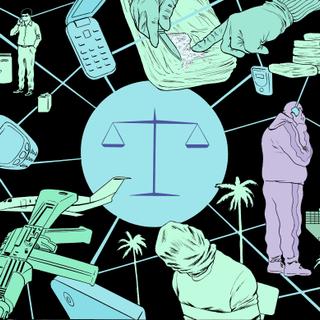


The drug mega-trial set to unveil the behind-the-scenes of European trafficking
InvestigationThe drug trafficking trial held in Brussels from Monday, with 125 defendants of 15 different nationalities and a reinforced concrete bunker courthouse, is expected to last up to five months.
The fire broke out in the kitchen one night in August 2020. Police officers dispatched that evening to the second floor of a small building in Brussels soon found that no one had been injured. They also noticed that the apartment, rented in the name of a Colombian citizen, was surprisingly spartan. It looked more like a chemist's back room. In the kitchen were three intact microwave ovens despite the blaze, and on the floor, where the fire had started, were tubs of solvents. The four survivors, who had taken refuge on the upper floor, hardly seemed relieved to have escaped the worst. Looking at one of them, the officers noticed another detail: their fingers were coated with a sticky white powder. The man in question, of Albanian origin, was no baker. It was in this clandestine laboratory that he had converted liquid cocaine into powder, ready for sale.
Between them, the two couples living at this address formed the link between South American coca plantations and the European market, where Albanian criminal groups now occupy a prime position. It was written in black and white in an official report from the Belgian Federal Police: "We can confirm that MGE and CVM deliberately married Colombian women to strengthen their position in the narcotics trade and therefore be linked to the cocaine-producing country of Colombia."
The fortuitous discovery of this "lab," where 12 kilos of "extremely pure" cocaine were seized, marked the beginning of an extensive investigation that lasted over two years. It was a multi-layered case, which led Belgian police on the trail of drug traffickers with direct links to Latin America, but also operating in Morocco, the Netherlands, Germany, Italy, France and Sweden. Revolving around the Albano-Colombian core group, led by 50-year-old MGE, the case grew bigger by the month, culminating on Monday, December 18, in a high-profile trial in Brussels.
A total of 125 defendants representing 15 different nationalities have been summoned to a setting befitting the case: the Justitia bunker court, located in the reinforced concrete former NATO headquarters on the outskirts of the Belgian capital. It took nothing less to accommodate such a cast. According to a police source, "the investigation unveiled 'high-value targets', as well as henchmen, logisticians, individuals retrieving a shipment, others providing their services at a given moment, and even those offering to be a hitman or a gang tasked with intimidation." The list also includes indoor cannabis producers, landlords and frontmen, not to mention a the owner of a friterie – a foodtruck specializing in French fries – an influencer and even a police officer suspected of corruption.
You have 75% of this article left to read. The rest is for subscribers only.
